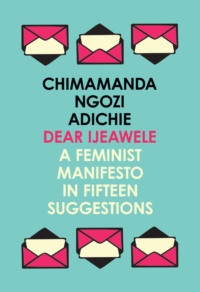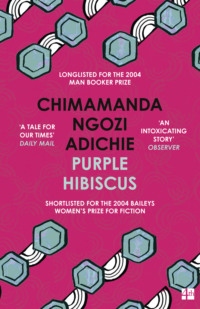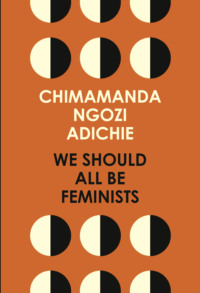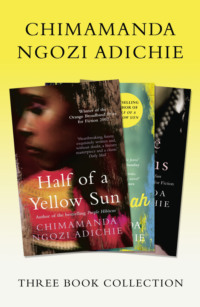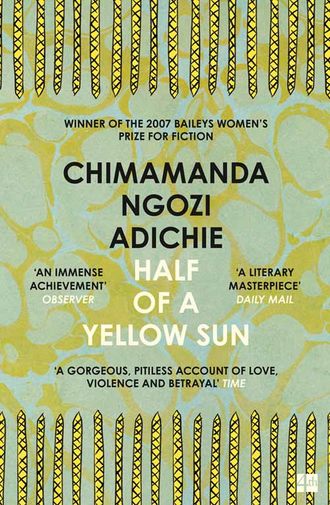
Полная версия
Half of a Yellow Sun
‘So her revolutionary lover has admitted you into the fold. We should be grateful. It used to be that he allowed only black lecturers in his house.’
‘Yes, he told me. He said that Nsukka was full of people from USAID and the Peace Corps and Michigan State University, and he wanted a forum for the few Nigerian lecturers.’
‘And their nationalist passion.’
‘I suppose so. He is refreshingly different.’
‘Refreshingly different,’ Kainene repeated. She stopped to flatten something on the ground with the sole of her sandals. ‘You like them, don’t you? Olanna and Odenigbo.’
He wanted to look into her eyes, to try and discern what she wanted him to say. He wanted to say what she wanted to hear. ‘Yes, I like them,’ he said. Her hand was lax in his and he worried that she would slip it away. ‘They’ve made it much easier for me to get used to Nsukka,’ he added, as if to justify his liking them. ‘I’ve settled in quite quickly. And of course there’s Harrison.’
‘Of course, Harrison. And how is the Beet Man doing?’
Richard pulled her to him, relieved that she was not annoyed. ‘He’s well. He is a good man, really, very amusing.’
They were in the orchard now, in the dense interweaving of orange trees, and Richard felt a strangeness overcome him. Kainene was speaking, something about one of her employees, but he felt himself receding, his mind unfurling, rolling back on its own. The orange trees, the presence of so many trees around him, the hum of flies overhead, the abundance of green, brought back memories of his parents’ house in Wentnor. It was incongruous that this tropical, humid place, with the sun turning the skin of his arms a mild scarlet and the bees sunning themselves, should remind him of the crumbling house in England, which was draughty even in summer. He saw the tall poplars and willows behind the house, in the fields where he stalked badgers, the rumpled hills covered in heather and bracken that spread for miles and miles, dotted with grazing sheep. Blue remembered hills. He saw his father and his mother sitting with him up in his bedroom, which smelt of damp, while his father read them poetry.
Into my heart on air that kills
From yon far country blows:
What are those blue remembered hills,
What spires, what farms are those?
That is the land of lost content
I see it shining plain,
The happy highways where I went
And cannot come again.
His father’s voice would always deepen at the phrase Blue remembered hills, and when they left his room, and for the weeks afterwards when they would be away, he would look out of his window and watch the far-off hills take on a blue tinge.
Richard was bewildered by Kainene’s busy life. Seeing her in Lagos, in brief meetings at the hotel, he had not realized that hers was a life that ran fully and would run fully even if he was not in it. It was strangely disturbing to think that he was not the only occupant of her world, but stranger still was how her routines were already in place, after only a few weeks in Port Harcourt. Her work came first; she was determined to make her father’s factories grow, to do better than he had done. In the evenings, visitors – company people negotiating deals, government people negotiating bribes, factory people negotiating jobs – dropped by, parking their cars near the entrance to the orchard. Kainene always made sure they didn’t stay long, and she didn’t ask him to meet them because she said they would bore him, so he stayed upstairs reading or scribbling until they left. Often, he would try to keep his mind from worrying about failing Kainene that night; his body was still so unreliable and he had discovered that thinking about failure made it more likely to happen.
It was during his third visit to Port Harcourt that the steward knocked on the bedroom door to announce, ‘Major Madu came, madam,’ and Kainene asked if Richard would please come down with her.
‘Madu is an old friend and I’d like you to meet him. He’s just come back from an army training course in Pakistan,’ she said.
Richard smelt the guest’s cologne from the hallway, a cloying, brawny scent. The man wearing it was striking in a way that Richard immediately thought was primordial: a wide, mahogany-coloured face, wide lips, a wide nose. When he stood to shake hands, Richard nearly stepped back. The man was huge. Richard was used to being the tallest man in a room, the one who was looked up to, but here was a man who was at least three inches taller than he was, and with a width to his shoulders and a firm bulk to his body that made him seem taller, hulking.
‘Richard, this is Major Madu Madu,’ Kainene said.
‘Hello,’ Major Madu said. ‘Kainene has told me about you.’
‘Hello,’ Richard said. It was too intimate, to hear this mammoth man with the slightly condescending smile on his face say Kainene’s name like that, as if he knew Kainene very well, as if he knew something that Richard did not know, as if whatever Kainene had told him about Richard had been whispered in his ear, amid the silly giggles born of physical intimacy. And what sort of name was Madu Madu anyway? Richard sat on a sofa and refused Kainene’s offer of a drink. He felt pale. He wished Kainene had said, This is my lover, Richard.
‘So you and Kainene met in Lagos?’ Major Madu asked.
‘Yes,’ Richard said.
‘She first told me about you when I called her from Pakistan about a month ago.’
Richard could not think of what to say. He did not know Kainene had talked to him from Pakistan and did not remember her ever mentioning a friendship with an army officer whose first name and surname were the same. ‘And how long have you known each other?’ Richard asked, and immediately wondered if he sounded suspicious.
‘My family’s compound in Umunnachi is right next to the Ozobias’.’ Major Madu turned to Kainene. ‘Aren’t our forefathers said to be related? Only that your people stole our land and we cast you out?’
‘It was your people who stole the land,’ Kainene said, and laughed. Richard was surprised to hear the husky tone of her laughter. He was even more surprised at how familiarly Major Madu behaved, the way he sank into the sofa, got up to flip the album in the stereo, joked with the stewards serving dinner. Richard felt left out of things. He wished Kainene had told him that Major Madu would be staying for dinner. He wished she would drink gin and tonic like him rather than whisky with water like Major Madu. He wished the man would not keep asking him questions, as if to engage him, as if the man were the host and Richard the visitor. How are you enjoying Nigeria? Isn’t the rice delicious? How is your book going? Do you like Nsukka?
Richard resented the questions and the man’s perfect table manners.
‘I trained at Sandhurst’, Major Madu said, ‘and what I hated most was the cold. Not least because they made us run every morning in the bloody cold with only a thin shirt and shorts on.’
‘I can see why you’d find it cold,’ Richard said.
‘Oh, yes. To each his own. I’m sure you’ll soon get very homesick here,’ he said.
‘I don’t think so at all,’ Richard said.
‘Well, the British have just decided to control immigration from the Commonwealth, haven’t they? They want people to stay in their own countries. The irony, of course, is that we in the Commonwealth can’t control the British moving to our countries.’
He chewed his rice slowly and examined the bottle of water for a moment, as if it were wine whose vintage he wanted to know.
‘Right after I came back from England, I was part of the Fourth Battalion that went to the Congo, under the United Nations. Our battalion wasn’t well run at all, but despite that, I preferred Congo to the relative safety of England. Just because of the weather.’ Major Madu paused. ‘We weren’t run well at all in the Congo. We were under the command of a British colonel.’ He glanced at Richard and continued to chew.
Richard bristled; his fingers felt stiff and he feared his fork would slip from his grasp and this insufferable man would know how he felt.
The doorbell rang just after dinner while they sat on the moonlit veranda, drinking, listening to High Life music.
‘That must be Udodi, I told him to meet me here,’ Major Madu said.
Richard slapped at an irritating mosquito near his ear. Kainene’s house seemed to have become a meeting place for the man and his friends.
Udodi was a smallish, ordinary-looking man with nothing of the knowing charm or subtle arrogance of Major Madu. He seemed drunk, almost manic, in the way he shook Richard’s hand, pumping up and down. ‘Are you Kainene’s business associate? Are you in oil?’ he asked.
‘I didn’t do the introductions, did I?’ Kainene said. ‘Richard, Major Udodi Ekechi is a friend of Madu’s. Udodi, this is Richard Churchill.’
‘Oh,’ Major Udodi said, his eyes narrowing. He poured some whisky into a glass, drank it in one gulp, and said something in Igbo to which Kainene replied, in cold, clear English, ‘My choice of lovers is none of your business, Udodi.’
Richard wished he could open his mouth and fluidly tell the man off, but he said nothing. He felt helplessly weak, the kind of weakness that came with illness, with grief. The music had stopped and he could hear the far-off whooshing of the sea’s waves.
‘Sorry, oh! I did not say it was my business!’ Major Udodi laughed and reached again for the bottle of whisky.
‘Easy now,’ Major Madu said. ‘You must have started early at the mess.’
‘Life is short, my brother!’ Major Udodi said, pouring another drink. He turned to Kainene. ‘I magonu, you know, what I am saying is that our women who follow white men are a certain type, a poor family and the kind of bodies that white men like.’ He stopped and continued, in a mocking mimicry of an English accent, ‘Fantastically desirable bottoms.’ He laughed. ‘The white men will poke and poke and poke the women in the dark but they will never marry them. How can! They will never even take them out to a good place in public. But the women will continue to disgrace themselves and struggle for the men so they will get chicken-feed money and nonsense tea in a fancy tin. It’s a new slavery, I’m telling you, a new slavery. But you are a Big Man’s daughter, so what you are doing with him?’
Major Madu stood up. ‘Sorry about this, Kainene. The man isn’t himself.’ He pulled Major Udodi up and said something in swift Igbo.
Major Udodi was laughing again. ‘Okay, okay, but let me take the whisky. The bottle is almost empty. Let me take the whisky.’
Kainene said nothing as Major Udodi took the bottle from the table. After they left, Richard sat next to her and took her hand. He felt as if he had disappeared, as if that was the reason Major Madu did not include him in the apology. ‘He was dreadful. I’m sorry he did that.’
‘He was hopelessly drunk. Madu must feel terrible right now,’ Kainene said. She gestured to the file on the table and added, ‘I’ve just got the contract to supply army boots for the battalion in Kaduna.’
‘That’s nice.’ Richard drank the last drop from his glass and watched as Kainene looked through the file.
‘The man in charge was Igbo, and Madu said he was keen to give the contract to a fellow Igbo. So I was lucky. And he’s asking only for a five per cent cut.’
‘A bribe?’
‘Oh, aren’t we innocent.’
Her mockery irritated him, as did the speed with which she had absolved Major Madu of any responsibility for Major Udodi’s boorish behaviour. He stood up and began to pace the veranda. Insects were humming around the fluorescent bulb.
‘You’ve known Madu for very long then,’ he said finally. He hated calling the man by his first name; it assumed a cordiality he did not feel. But then he had no choice. He would certainly not call him Major; using a title would be too elevating.
Kainene looked up. ‘Forever. His family and ours are very close. I remember once, years ago, when we went to Umunnachi to spend Christmas, he gave me a tortoise. The strangest and best present I ever got from anybody. Olanna thought it was wrong of Madu to take the poor thing out of its natural habitat and whatnot, but she didn’t much get along with Madu anyway. I put it in a bowl, and of course it died soon afterwards.’ She went back to looking through the file.
‘He’s married, isn’t he?’
‘Yes. Adaobi is doing her bachelor’s in London.’
‘Is that why you’re seeing him so often?’ His question came out in a near-croak, as though he needed to clear his throat.
She did not respond. Perhaps she had not heard him. It was clear that the file, the new contract, occupied her mind. She got up. ‘I’ll just make some notes for a minute in the study and join you.’
He wondered why he could simply not ask if she found Madu attractive and if she had ever been involved with him or, worse yet, was still involved with him. He was afraid. He moved towards her and put his arms around her and held her tightly, wanting to feel the beat of her heart. It was the first time in his life he felt as if he could belong somewhere.
1. The Book: The World Was Silent When We Died
For the prologue, he recounts the story of the woman with the calabash. She sat on the floor of a train squashed between crying people, shouting people, praying people. She was silent, caressing the covered calabash on her lap in a gentle rhythm until they crossed the Niger, and then she lifted the lid and asked Olanna and others close by to look inside.
Olanna tells him this story and he notes the details. She tells him how the bloodstains on the woman’s wrapper blended into the fabric to form a rusty mauve. She describes the carved designs on the woman’s calabash, slanting lines crisscrossing each other, and she describes the child’s head inside: scruffy plaits falling across the dark-brown face, eyes completely white, eerily open, a mouth in a small surprised O.
After he writes this, he mentions the German women who fled Hamburg with the charred bodies of their children stuffed in suitcases, the Rwandan women who pocketed tiny parts of their mauled babies. But he is careful not to draw parallels. For the book cover, though, he draws a map of Nigeria and traces in the Y shape of the rivers Niger and Benue in bright red. He uses the same shade of red to circle the boundaries of where, in the Southeast, Biafra existed for three years.
4
Ugwu cleared the dining table slowly. He removed the glasses first, then the stew-smeared bowls and the cutlery, and finally he stacked plate on top of plate. Even if he hadn’t peeked through the kitchen door as they ate, he would still know who had sat where. Master’s plate was always the most rice-strewn, as if he ate distractedly so that the grains eluded his fork. Olanna’s glass had crescent-shaped lipstick marks. Okeoma ate everything with a spoon, his fork and knife pushed aside. Professor Ezeka had brought his own beer, and the foreign-looking brown bottle was beside his plate. Miss Adebayo left onion slices in her bowl. And Mr Richard never chewed his chicken bones.
In the kitchen, Ugwu kept Olanna’s plate aside on the Formica counter and emptied the rest, watching rice, stew, greens, and bones slide into the dustbin. Some of the bones were so well cracked they looked like wood shavings. Olanna’s did not, though, because she had only lightly chewed the ends and all three still had their shape. Ugwu sat down and selected one and closed his eyes as he sucked it, imagining Olanna’s mouth enclosing the same bone.
He sucked languidly, one bone after another, and did not bother to tone down the slurpy sounds his mouth made. He was alone. Master had just left for the staff club with Olanna and their friends. The house was always quietest now, when he could linger over nothing, with the lunch dishes in the sink and dinner far off and the kitchen bathed in incandescent sunlight. Olanna called this his Schoolwork Time, and when she was home, she would ask him to take his home work into the bedroom. She didn’t know that his homework never took long, that he would sit by the window afterwards and struggle through difficult sentences in one of Master’s books, looking up often to watch the butterflies dipping and rising above the white flowers in the front yard.
He picked up his exercise book while sucking the second bone. The cold marrow was tart on his tongue. He read the verse, which he had copied so carefully from the blackboard that it looked like Mrs Oguike’s handwriting, and then closed his eyes and recited it.
I can’t forget that I’m bereft
Of all the pleasant sights they see,
Which the Piper also promised me.
For he led us, he said, to a joyous land,
Joining the town and just at hand,
Where waters gushed and fruit trees grew,
And flowers put forth a fairer hue,
And everything was strange and new.
He opened his eyes and scanned the verse to make sure he had missed nothing. He hoped Master would not remember to ask him to recite it because, although he had memorized the verse correctly, he would have no answer when Master asked, What does it mean? Or, What do you think it is really saying? The pictures in the book Mrs Oguike gave out, of the long-haired man with happy rats following him, were incomprehensible, and the more Ugwu looked at them, the more certain he became that it was all some sort of senseless joke. Even Mrs Oguike did not seem to know what it meant. Ugwu had come to like her – Mrs Oguike – because she did not treat him with special concern, did not seem to notice that he sat alone in the classroom at break time. But she had noticed how fast he learnt the very first day when she gave him oral and written tests while Master waited outside the airless room. ‘The boy will surely skip a class at some point, he has such an innate intelligence,’ she had told Master afterwards, as if Ugwu were not standing right beside them, and innate intelligence instantly became Ugwu’s favourite expression.
He closed the exercise book. He had sucked all the bones, and he imagined that the taste of Olanna’s mouth was in his as he started to wash the dishes. The first time he sucked her bones, weeks ago, it was after he saw her and Master kissing in the living room on a Saturday morning, their open mouths pressed together. The thought of her saliva in Master’s mouth had both repelled and excited him. It still did. It was the same way he felt about her moaning at night; he did not like to hear her and yet he often went to their door to press his ear against the cold wood and listen. Just as he examined the underwear she hung in the bathroom – black slips, slippery bras, white pants.
She had blended so easily into the house. In the evenings, when guests filled the living room, her voice stood out in its clear perfection, and he fantasized about sticking out his tongue at Miss Adebayo and saying, ‘You cannot speak English like my madam, so shut your dirty mouth.’ It seemed as if her clothes had always been in the wardrobe, her High Life music always come from the radiogram, her coconut scent always wafted over every room, and her Impala always parked in the driveway. Still, he missed the old days with Master. He missed the evenings when he would sit on the floor of the living room while Master talked in his deep voice and the mornings when he served Master’s breakfast, knowing that the only voices that could be heard were theirs.
Master had changed; he looked at Olanna too often, touched her too much, and when Ugwu opened the front door for him, his eyes expectantly darted past into the living room to see if Olanna was there. Only yesterday, Master told Ugwu, ‘My mother will be visiting this weekend, so clean the guest room.’ Before Ugwu could say Yes, sah, Olanna said, ‘I think Ugwu should move to the Boys’ Quarters. That way we’ll have a free guest room. Mama may stay a while.’
‘Yes, of course,’ Master said, so promptly that it annoyed Ugwu; it was as if Master would stick his head in a raging fire if Olanna asked him to. It was as if she had become the master. But Ugwu didn’t mind moving to the room in the Boys’ Quarters, which was empty except for some cobwebs and cartons. He could hide things he had saved there; he could make it fully his. He had never heard Master speak about his mother, and, as he cleaned the guest room later, he imagined what she would be like, this woman who had bathed Master as a baby, fed him, wiped his running nose. Ugwu was in awe of her already, for having produced Master.
He finished the lunch dishes quickly. If he was as quick in preparing the greens for the dinner pottage, he could go down to Mr Richard’s house and talk to Harrison for a little while before Master and Olanna came back. These days, he shredded the greens with his hands instead of slicing them. Olanna liked them that way; she said they retained more of their vitamins. He, too, had started to like them, just as he liked the way she taught him to fry eggs with a little milk, to cut fried plantains in dainty circles rather than ungainly ovals, to steam moi-moi in aluminium cups rather than banana leaves. Now that she left most of the cooking to him, he liked to look through the kitchen door from time to time, to see who murmured the most compliments, who liked what, who took second helpings. Dr Patel liked the chicken boiled with uziza. So did Mr Richard, although he never ate the chicken skin. Perhaps the pale chicken skin reminded Mr Richard of his own skin. There was no other reason Ugwu could think of; the skin was, after all, the tastiest part. Mr Richard always said, ‘Fantastic chicken, Ugwu, thank you,’ when Ugwu came out to bring more water or to clear something away. Sometimes, while the other guests retired to the living room, Mr Richard would come into the kitchen to ask Ugwu questions. They were laughable questions. Did his people have carvings or sculptures of gods? Had he ever been inside the shrine by the river? Ugwu was even more amused that Mr Richard wrote his answers down in a small book with a leather cover. Some days ago, when Ugwu offhandedly mentioned the ori-okpa festival, Mr Richard’s eyes turned a brighter blue and he said he wanted to see the festival; he would ask Master if he and Ugwu could drive to his hometown.
Ugwu laughed as he brought the greens out of the refrigerator. He could not imagine Mr Richard during the ori-okpa festival, where the mmuo (Mr Richard said they were masquerades, weren’t they, and Ugwu agreed, as long as masquerades meant spirits) paraded the village, flogged young men, and chased after young women. The mmuo themselves might even laugh at the sight of a pale stranger scribbling in a notebook. But he was pleased that he had mentioned the festival to Mr Richard, because it meant an opportunity to see Nnesinachi before she left for the North. To think how impressed she would be when he arrived in a white man’s car, driven by the white man himself! She would certainly notice him this time, he was sure, and he could not wait to impress Anulika and his cousins and relatives with his English, his new shirt, his knowledge of sandwiches and running tap water, his scented powder.
Ugwu had just washed the shredded greens when he heard the doorbell. It was too early for Master’s friends. He went to the door, wiping his hands on his apron. For a moment, he wondered if his aunty was really standing there or if he was seeing an image of her only because he had been thinking about home.
‘Aunty?’
‘Ugwuanyi’, she said, ‘you have to come home. Oga gi kwanu? Where is your master?’
‘Come home?’
‘Your mother is very sick.’


